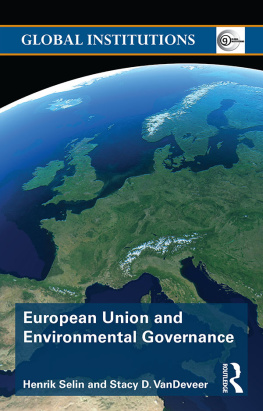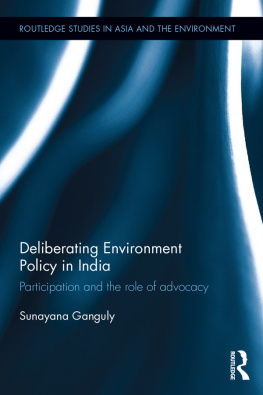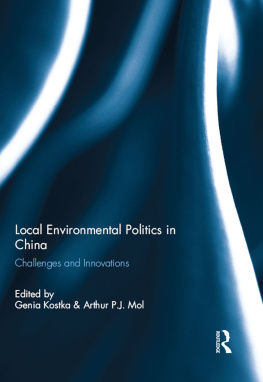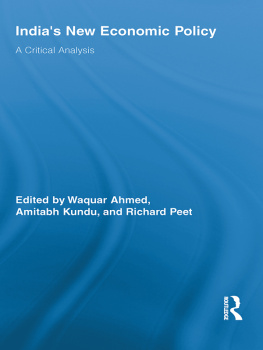Local Economic Development and the Environment
Concerns about the impact of economic development upon the global environment have increased in recent years. Sustainable development has been proposed as a means of reconciling the pressures between the two, allowing the integration of economic, environmental and social concerns. While policy makers at international, national and local levels have rapidly adopted sustainable development as a key aim, there is a great deal of uncertainty as to what it means in practice.
This book focuses upon the potential to integrate economic and environmental policies at the local and regional scale. Local initiatives are investigated within their wider economic and environmental policy contexts in order to illustrate both the constraints and opportunities for local policy makers. Attention is given to global economic trends, as well as to the specific policy contexts of the European Union and the national contexts of the UK, USA, Australia, Japan and Sweden. The key principles for designing integrative policies and descriptions of initiatives and projects in a variety of locations are also considered.
This book will be of vital interest not only to students and academics working in the field of local and regional economic development, but also to policy makers and planners seeking guidelines for the role of local government in the local economy, sustainable development and the implementation of policies.
David Gibbs is Professor of Human Geography at the University of Hull. His research interests are in the field of local and regional economic development, with a paticular focus upon the implications of both technological change and environmental issues for localities and regions. He is the author of several articles on these topics in a number of international geographical journals.
Routledge Research Global Environmental Change Series
Editorial Advisory Board: Alister Scott, Jim Skea, Michael Redclift, Martin Parry, Timothy ORiordan, Robin Grove-White, Kathy Homewood, Judith Rees, Camilla Toulmin, Kerry Turner, Richard Welford and Stephen Yearley
1 THE CONDITION OF SUSTAINABILITY
Ian Drummond and Terry Marsden
2 WORKING THE SAHEL
Environment and society in Northern Nigeria
Michael Mortimore and Bill Adams
3 GLOBAL TRADE AND GLOBAL SOCIAL ISSUES
Edited by Annie Taylor and Caroline Thomas
4 ENVIRONMENTAL POLICIES AND NGO INFLUENCE
Land degradation and sustainable resource management in Sub-Saharan Africa
Edited by Alan Thomas, Susan Carr and David Humphreys
5 THE SOCIOLOGY OF ENERGY, BUILDINGS AND THE ENVIRONMENT
Constructing knowledge, designing practice
Simon Guy and Elizabeth Shove
6 LIVING WITH ENVIRONMENTAL CHANGE
Social vulnerability, adaptation and resilience in Vietnam
Edited by W. Neil Adger, P. Mick Kelly and Nguyen Huu Ninh
7 LAND AND LIMITS
Interpreting sustainablity in the planning process
Susan Owens and Richard Cowell
8 THE BUSINESS OF GREENING
Edited by Stephen Fineman
9 INDUSTRY AND ENVIRONMENT IN LATIN AMERICA
Edited by Rhys Jenkins
10 LOCAL ECONOMIC DEVELOPMENT AND THE ENVIRONMENT
David Gibbs
Also available in the Routledge Global Environmental Change Series:
TIMESCAPES OF MODERNITY
Barbara Adam
REFRAMING DEFORESTATION
James Fairhead and Melissa Leach
BRITISH ENVIRONMENTAL POLICY AND EUROPE
Edited by Philip Lowe
THE POLITICS OF SUSTAINABLE DEVELOPMENT
Edited by Susan Baker, Maria Kousis, Dick Richardson and Stephen Young
ARGUMENT IN THE GREENHOUSE
Mick Mabey, Stephen Hall, Clare Smith and Sujata Gupta
ENVIRONMENTALISM AND THE MASS MEDIA
Graham Chapman, Keval Kumar, Caroline Fraser and Ivor Gaber
ENVIRONMENTAL CHANGE IN SOUTHEAST ASIA
Edited by Michael Parnwell and Raymond Bryant
THE POLITICS OF CLIMATE CHANGE
Edited by Timothy ORiordan and Jill Jagger
POPULATION AND FOOD
Tim Dyson
THE ENVIRONMENT AND INTERNATIONAL RELATIONS
Edited by John Vogler and Mark Imber
GLOBAL WARMING AND ENERGY DEMAND
Edited by Terry Barker, Paul Ekins and Nick Johnstone
SOCIAL THEORY AND THE GLOBAL ENVIRONMENT
Michael Redclift and Ted Benton
First published 2002
by Routledge
11 New Fetter Lane, London EC4P 4EE
Simultaneously published in the USA and Canada
by Routledge
29 West 35th Street, New York, NY 10001
Routledge is an imprint of the Taylor & Francis Group
2002 David Gibbs
Typeset in Sabon by Exe Valley Dataset Ltd, Exeter
Printed and bound in Great Britain by MPG Books Ltd, Bodmin
All rights reserved. No part of this book may be reprinted or reproduced or utilised in any form or by any electronic, mechanical, or other means, now known or hereafter invented, including photocopying and recording, or in any information storage or retrieval system, without permission in writing from the publishers.
British Library Cataloguing in Publication Data
A catalogue record for this book is available from the British Library
Library of Congress Cataloging in Publication Data
Gibbs, David, 1955.
Local economic development and the environment / David Gibbs.
p. cm.
Includes bibliographical references and index.
1. Sustainable development. 2. Economic developmentEnvironmental aspects. I. Title.
HD75.6.G52 2002
658.83dc21
2001048176
ISBN 0415168252
Preface
My initial interest in the environmental implications of local and regional economic development came about through a commissioned piece of research for the Centre for Local Economic Strategies in Manchester back in 1992. Since that time, my interest has further developed through conducting a number of research projects in this area, in the form of academic projects funded through the UK research councils, as well as more consultancy-type work for practitioners. This book represents an attempt to pull much of this work together into some sort of coherent whole. Coming from a background in economic geography, I have noticed a general lack of interest in the environmental consequences of economic development by most other economic geographers. Similarly, though, when reading much of the environmental literature, and the proposals that are made for sustainable development and more environmentally-aware policies, I have also noticed a lack of awareness of the broader economic context for such initiatives. In both cases I think this is a pity, as both sets of literature and authors have much to offer each other. Obviously there are exceptions to the lack of overlap and some researchers have drawn upon both literatures, but I think there remains considerable scope for much more work that attempts to combine the two interpretations. The importance of doing so relates, in part, to the much greater attention paid to environmental issues in economic policy at all spatial scales in recent years. Obviously, this also relates to the serious threat that such ecological problems pose to economic and social activities as they currently exist. Although not everyone is convinced of the magnitude of such changes, it is widely agreed that ecological problems such as enhanced global warming, changing weather patterns and sea level rise are occurring and that the current organisation of economic activities is in large part responsible. The concept of sustainable development, widely publicised following the Rio Earth Summit in 1992, suggests that economic, environmental and social aims can now be made compatible. Exactly how this is to be done has remained very unclear, despite the widespread adoption of at least the rhetoric of sustainability in policy documents at international, national and local scales. It is also notable that many of these policy documents, from Agenda 21 onwards, privilege the local scale as the key site for policy intervention, though frequently without much justification other than arguing that it is somehow the most appropriate level for intervention. This book therefore attempts to explore some of these issues in greater depth. In particular I have been concerned to try and set out the broader international and national contexts within which local and regional attempts to introduce policies and strategies to combine economic development and environmental issues can be situated. Hopefully, this will lead to a greater understanding by both academics and policy makers of both the potential for, and limits to, such integrative policy initiatives.








